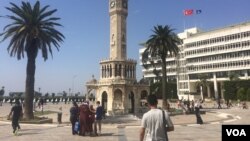“Every boat has one passenger in charge of driving and one person who sends me a WhatsApp message every 60 seconds once they are on the water,” said a smuggler who called himself Kareem, as he explained the safety procedures of illegally crossing into Greece.
If there is no message after a minute, Kareem said, he calls either the Turkish police or the Greek police, depending on the boat’s location. The police then find the vessel and rescue the people, he said.
But sometimes they cannot.
The smuggling business is booming in Izmir and it has developed into its own, complex economy. Smugglers say they use social media for safety. But refugees say the only way to keep safe is to master the system and carefully investigate the smugglers.
Passage planning
At a marketplace in Izmir, refugees and smugglers drink tea and smoke as they plan their journeys. It is the spot for passage planning, and nearly all the hotels in the area are booked. Many people sleep on the streets.
Shoppers returning to their hotels walk by with life jackets, new backpacks and balloons to wrap their cellphones in while on the boat. As people mill around the square, there are questions everyone is asking: "Did you find a boat? When are you going?"
In some places the trip is as little as 10 kilometers, but the people are packed into flimsy rubber boats and it can be deadly. More than 2,760 people have died this year trying to cross the sea into Europe, according to the International Migration Organization. That is roughly 20 percent more than last year, as a massive influx of refugees from the Middle East and Africa clamors to get into Europe.
In the market, the mood appears tense, and refugees say it is because regular police raids keep everyone on edge.
But many people are quietly jovial.
At a sidewalk cafe by the square, an Iraqi man from Mosul laughed out loud when asked whether he was scared to go on the boats. He asked: “After everything that has happened, we are going to fear some water?”
At the next table over, a group of teenage boys also laughed at the question, excited to be getting on a boat that night.
“I’m not just happy, I can’t believe it,” said 19-year-old Qusay, who recently fled Syria. “It’s like a dream. I am going to Germany.”
The four boys said their plan was hatched in Aleppo, Syria, about a year ago and it took that long to raise the thousands of dollars they each needed. The average smuggler's boat trip from Turkey to Greece costs between $1,350 and $2,250.
That doesn’t include the cost of smugglers to sneak them across the closed land border between Syria and Turkey; shelter; food; and more smugglers and transport to get them from Greece to Germany.
About $3,000 is considered the minimum. And this is a fortune for families who have lived in war zones for more than four years, or have lived jobless in refugee camps.
“When we found our smuggler and the money, we left,” Qusay said as he poured Pepsi into a small plastic cup.
“It also took us a year because we had to learn the business before we could come,” added his cousin, 15-year-old Kutada.
Getting educated
Learning the business includes finding people who have worked with your smuggler and lived to tell the tale, he said. That task is mainly done in cities like Izmir, where refugees gather equipment and wait for smugglers to call them when the coast is clear and they can launch their boat. The boys had been there for days, investigating, before they were ready to go.
Most refugees here also need to find a person they trust in Izmir. They give the smuggler’s payment to the person, and he or she pays the smuggler when the passengers arrive safely in Greece. It’s for security, they say, so the smuggler doesn’t run off with the money.
“Smugglers are cheating the people,” said 17-year-old Kais, another cousin, not at all worried that he was sitting next to three smugglers.
The men at the next table later said smugglers have their own system to make sure no one gets cheated out of their payments from refugees.
“It’s because we trust each other so much,” joked Kareem.
The boys said they didn't know what time they would cast off, because they were still waiting for the final phone call.
But as they left their table to make final preparations for the journey, Qusay, still jovial, reminded them of why they were taking the risk: the Syrian war that has claimed hundreds of thousands of lives and forced half the people in the country to flee their homes.
Qusay, slinging his new backpack on his shoulder, said, “Animals in Syria live better than us.”






